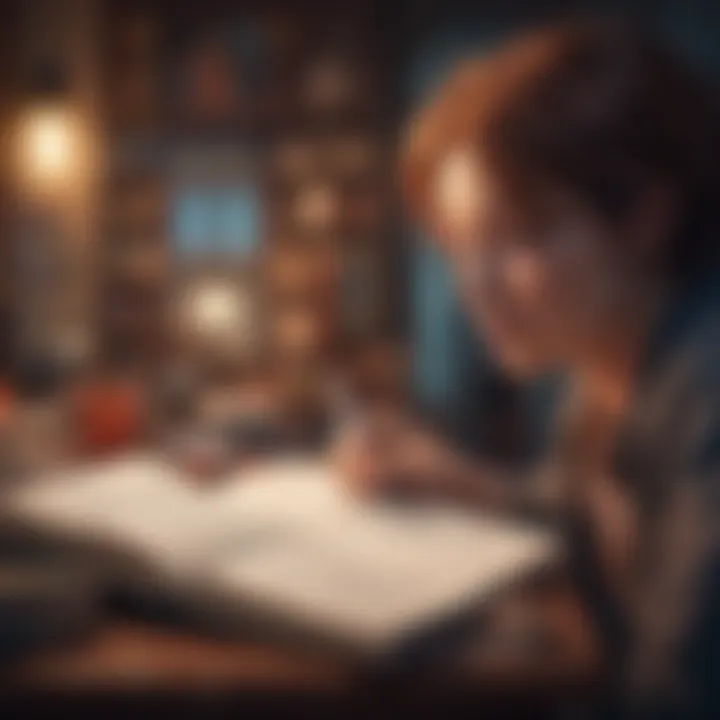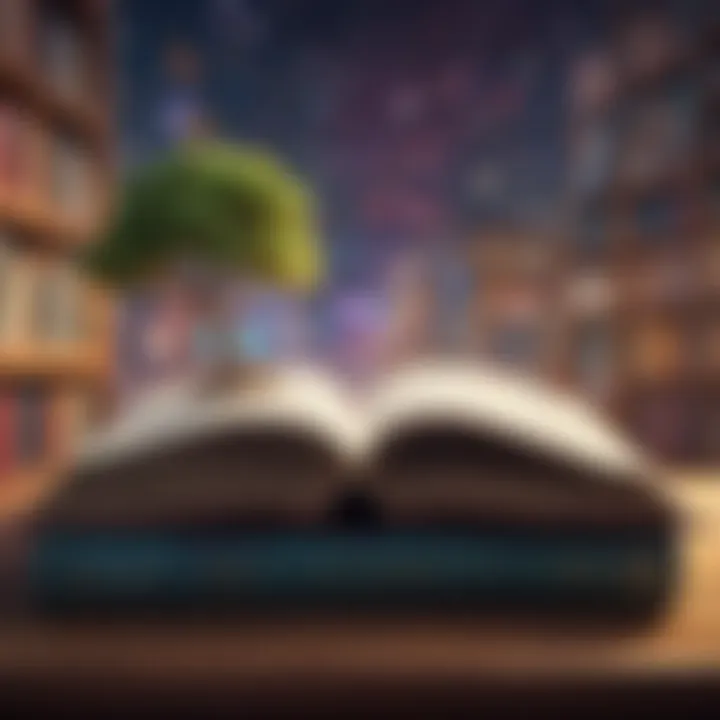Transformative Books for Personal Growth and Change


Intro
Books have an uncanny knack of setting our minds ablaze, don't they? They can be your guide in finding direction or make you question troubles you didn’t even know you had. Indeed, literature is not just for leisure; it's a tool for profound transformation. There are countless tomes that promise life-changing insights, offering readers a fresh perspective on everything from personal growth to emotional intelligence. In this exploration, we clarify how some of these key texts resonate with varying audiences, from students eager for self-improvement to seasoned professionals seeking clarity in complex matters.
When diving into transformative literature, themes and concepts become the backbone of the reader's journey. This guide aims to piece together these themes, offering comprehensive summaries and actionable insights that can result in tangible change.
Here, we will highlight noteworthy ideas from essential books within this realm while grounding our discussion in real-life applications. If you’re aiming to sharpen your intellectual skills or nurture your emotional well-being, keep reading; we’ve got some valuable gems to share.
Key Concepts and Insights
Main Ideas from the Book
Every transformative book bears fruit, and in the orchard of literature, some trees bear fruit more substantial than others. The core messages tend to hover around self-discovery, resilience, and the ability to alter one’s mindset. For instance, in The Power of Now by Eckhart Tolle, the focus is primarily on mindfulness, teaching us that living in the present moment is not just a desirable state but essential for a fulfilling life. This aligns grit and grace just as a tightrope walker balances.
Likewise, James Clear's Atomic Habits dismisses the myth that overnight success is the route to transformation; instead, it illuminates the significance of small, consistent changes. This approach contrasts the common, often misguided, notion that radical shifts are necessary for progress.
Though each book introduces distinct perspectives, the ultimate takeaway remains clear: self-improvement is a process, often requiring patience and introspection.
Practical Applications of Concepts
Understanding these profound ideas is one thing, but translating them into daily life is where the rubber meets the road. Let’s break down a few practical applications:
- Mindfulness Practices: Inspired by Tolle, simple habits like daily meditation or taking moments to breathe deeply can significantly reduce anxiety and enhance focus.
- Habit Tracking: Using Clear’s insights, keep a journal where you log daily habits; this visibility often motivates accountability and a sense of achievement.
- Cognitive Restructuring: Many of these texts encourage readers to challenge negative thought patterns and replace them with affirmative and constructive ones. Learning to question your own narrative can lead to a powerful shift in perspective.
"You are what you think. If you change your thinking, you change your life.”
This quote underscores the endeavor of constant self-examination and evolution.
Recommendations and Further Reading
Related Books to Explore
If you find yourself thirsting for more enlightenment, here are a few titles you might want to tuck under your arm on your next trip to the bookstore:
- Mindset: The New Psychology of Success by Carol S. Dweck
- Daring Greatly by Brené Brown
- Man's Search for Meaning by Viktor E. Frankl
Additional Resources for Personal Development
There’s a wealth of knowledge to sift through in the world of personal development. Here are some platforms you might consider checking out:
- Reddit Personal Development Threads
- Wikipedia’s Psychology Resource
- Britannica on Emotional Intelligence
In summary, this journey through literary landscapes not only expands our understanding but also catalyzes personal growth.
Affirmative change beckons those who are willing to open books and, even more importantly, their hearts and minds.
Understanding Transformation Through Literature
Transformation through literature is a concept that resonates deeply within the human experience. Reading can be more than just a pastime; it can be a capstone, laying foundations for personal evolution and emotional growth. Books are not merely vessels of words. They are tools that can provoke thought, ignite inspiration, and even encourage one to reassess their priorities and viewpoints.
The Concept of Transformation
When we talk about transformation, we’re delving into the process of profound change, whether it's an internal shift in mindset or external alterations in behavior. For individuals seeking growth, this process can feel like climbing a mountain; arduous but ultimately rewarding. The concept of transformation acknowledges that change is not easy, but literature provides the scaffolding to make these transitions feasible. Stories, characters, and the wisdom shared within the pages can serve as mirrors reflecting one's own struggles and victories.
Literature gives insights into different realities and perspectives, helping readers identify patterns in their own lives. From a coming-of-age tale that encapsulates the turbulence of youth to a memoir detailing the grit and resilience required to overcome adversity, there’s a book for every juncture of life. Moreover, a single quote or passage can pivotally shape an individual’s understanding about themselves or the world around them, prompting reflection and often, a shift in behavior.
The Role of Literature in Personal Growth
Literature acts as a catalyst for personal growth by cultivating emotional intelligence, expanding worldviews, and encouraging critical thinking. When individuals engage with a well-written text, they immerse themselves in the author’s world. This experience stimulates empathy, as readers learn to walk in others' shoes. Such emotional experiences can pave the way for introspection, leading to significant personal discoveries.
Consider, for instance, how reading Viktor Frankl's Man's Search for Meaning offers insights into finding purpose even amid suffering. The lessons gleaned from such narratives can inspire readers to face their own challenges with renewed vigor.
"Literature does not just allow us to escape; it empowers us to confront our realities with fresh perspectives."
Furthermore, literature provides a wealth of examples of resilience, creativity, and hope. It showcases how others have navigated tough waters or achieved their dreams against all odds. Each page turned is an opportunity to draw lessons and inspirations that apply to real-life situations.
Books might even offer readers a sense of belonging, reassuring them that they are not alone in their struggles. They are windows into diverse cultures, philosophies, and attitudes that connect us all in this vast human experience. An understanding of global narratives fosters appreciation, forging a path toward understanding and inclusivity, ultimately contributing to holistic personal development.
Categories of Life-Changing Books
The journey of personal transformation often begins with a book in hand, an inkling of change sparking from the pages between the covers. In this section, we’ll dive into Categories of Life-Changing Books that can profoundly alter the fabric of one’s life. Each category represents distinct approaches and philosophies, all contributing to the broad landscape of personal growth.
Self-Help and Personal Development
When people think about books that can lead to transformation, self-help and personal development tomes usually spring to mind. These books tackle the challenges many face—self-doubt, anxiety, and even a lack of direction. They don’t just tell you what to do; they often pack practical strategies, exercises, and anecdotes.
Take, for instance, "Atomic Habits" by James Clear. This book delves into how tiny changes can result in remarkable outcomes. Clear's approach demystifies the journey of forming good habits while discarding the bad.
"Success is the product of daily habits—not once-in-a-lifetime transformations."
This emphasis on consistent effort over sudden gains resonates with readers. The real beauty lies in the tangible actions it prompts. But it’s not solely about self-optimization; it's about carving a path toward a more meaningful existence. The thoughtful exercises and reflective prompts can serve as a sturdy compass for those wandering in life.
Philosophy and Spirituality
Diving into philosophy and spirituality offers the opportunity to stir the deepest corners of one's mind and heart. This category is a translation of arcane wisdom into modern contexts, often connecting our inner selves with broader societal inquiries.
For example, Viktor Frankl's "Man's Search for Meaning" encapsulates the reality of finding purpose amidst horrific circumstances. It's not just a memoir; it’s a blueprint for rising above despair. Frankl proposes that meaning can be found in the most unimaginable suffering. The sheer profundity within these concepts lingers, prompting profound reflection long after the last page is turned.
Books from this category can deepen understanding of existential questions. They often pose ambiguous queries without offering clear-cut answers, inviting readers into a dialogue that can reshuffle existing beliefs.


Biographies and Memoirs
The allure of biographies and memoirs lies in the authenticity of lived experiences. Through personal tales, readers can glean insights into resilience, adaptability, and triumph over hardship. These narratives create a connection, making the achievements and struggles of others feel accessible.
Consider Nelson Mandela's "Long Walk to Freedom." Mandela details his life journey, filled with adversity yet marked by unwavering commitment to justice. The beauty in these stories often reflects universal themes of endurance and vision, urging individuals to begin their own journey of transformation starting from where they currently are.
Reading about another's journey beckons introspection and can catalyze change. The influence of such texts can ripple through one’s own narrative, allowing for personal revelations and motivation to forge ahead.
Fiction with Meaningful Messages
Fiction often gets sidelined when discussing transformative texts, but narratives woven with rich themes and moral dilemmas can impart wisdom in unexpected ways. These stories don't merely entertain; they challenge perceptions and encourage deep reflection regarding human nature.
A prime example is "The Alchemist" by Paulo Coelho. This novel, centered on a shepherd’s quest for his Personal Legend, underscores the importance of following one's dreams. The allegorical lessons intertwined in engaging plotlines allow readers to experience growth alongside characters, creating a sense of ownership over their own potential transformations.
Through escapism, fiction often mirrors reality, leading to insights that lodge themselves in our consciousness. This delicate balance of story and lesson engages readers more profoundly and encourages introspection about their own life's journey.
As we progress through these categories of books, we affirm that literature is not merely an escape but a road map ripe for exploration. Each selection can spark change, provoke discussion, or provide comfort—ultimately influencing you, the reader, on the path toward a transformed self.
Key Themes in Transformative Books
In exploring the landscape of transformative literature, certain key themes emerge as recurring beacons of wisdom. These themes serve not just as narratives, but as frameworks that shape individuals' perspectives and experiences. Grasping these themes can help readers identify with their own struggles, aspirations, and ultimately, their journey towards self-discovery. Each theme holds unique benefits, encouraging personal reflection and development in ways that resonate deeply with diverse audiences.
Resilience and Overcoming Adversity
Books that champion resilience often delve into stories that depict characters overcoming formidable challenges. Resilience isn’t merely bouncing back; it’s about evolving through hardship. In literature, this theme can be seen in works like "The Alchemist" by Paulo Coelho, which emphasizes that the path to achieving one’s dreams is often fraught with obstacles.
Reading about resilience encourages readers to confront their own adversities. When one sees how a character navigates through life’s tumult, it often ignites a spark of hope. It prompts individuals to ponder:
- What challenges am I facing?
- How can I change my perspective toward hardship?
- What strategies can I employ to push through?
This exploration can lead to personal breakthroughs that enhance one’s emotional toolkit, fostering a strong mindset capable of handling life's unpredictability.
The Search for Purpose
The quest for meaning is a fundamental human experience, and literature that tackles this theme often leads to profound insights. Books like "Man's Search for Meaning" by Viktor Frankl resonate deeply because they address existential questions that many grapple with. Frankl's experiences during the Holocaust highlighted that finding purpose is essential for psychological endurance.
The beauty of literature lies in its ability to articulate complex emotions and existential dilemmas. Delving into such texts allows readers to cultivate a sense of introspection:
- What gives my life meaning?
- How do my values align with my daily actions?
- Am I pursuing my passions or merely existing?
These questions can set one on a transformative journey, spurring both inner reflection and external action.
Empathy and Understanding
In today’s world, empathy is perhaps more crucial than ever. Books that emphasize this theme often provide perspectives that widen our understanding of others. Works such as "To Kill a Mockingbird" by Harper Lee illustrate the importance of looking at life from another's point of view.
Engaging with diverse narratives fosters empathy in readers, allowing for a broader understanding of cultural and social issues. Some reflective questions may include:
- How do my experiences shape my perceptions of others?
- In what ways can I cultivate greater compassion in my interactions?
- What stories challenge my preconceptions?
This reflective engagement can lead to profound shifts in attitudes, enabling individuals to approach situations with a more informed and compassionate perspective.
Mindfulness and Presence
The theme of mindfulness in literature serves as a gentle reminder of the present moment's importance. Books like "The Miracle of Mindfulness" by Thich Nhat Hanh delve into the significance of being fully present in one's life. Through the written word, this theme teaches readers to step back from daily chaos and appreciate the simplicity that exists in the moment.
Engaging with these concepts can inspire one to practice mindfulness actively:
- How can I incorporate mindful practices into my daily routine?
- What aspects of my life require more presence?
- What are the benefits of slowing down and observing my thoughts?
Ultimately, recognizing the value of mindfulness leads to a heightened awareness of one’s thoughts and surroundings, promoting mental clarity and emotional stability.
"Books are a uniquely portable magic." — Stephen King.
By comprehending these themes within transformative literature, readers gain the tools to reshape their lives. Each narrative not only tells a story but also offers wisdom that can lead to significant shifts in mindset and behavior. Through exploration and engagement with such literature, one embarks on a journey toward deeper understanding and personal growth.
Impact of Reading on the Mind
Reading is more than just a pastime; it's a powerful tool that shapes our thoughts, perspectives, and behaviors. The impact of reading on the mind extends well beyond mere entertainment or educational value. It fosters cognitive growth, nurtures emotional understanding, and fuels creativity. Understanding these dimensions can shed light on how and why certain books can transform lives.
Cognitive Benefits
At the heart of reading's impact lies its remarkable cognitive benefits. Engaging with texts challenges our brains to process language, analyze concepts, and draw connections between ideas. The more we read, the more we enhance our critical thinking skills.
- Increased Vocabulary: When we dive into different genres, we encounter diverse language styles. This exposure helps expand our vocabulary, which can improve communication skills, both written and verbal.
- Improved Focus and Concentration: In an age of constant distractions, reading requires a sustained level of focus. This practice can sharpen our attention spans and enable us to concentrate better in our daily lives.
"Reading is a way to think with someone else's mind."
– Harry F. Banks
- Enhanced Memory: Stories often revolve around complex narratives and characters. Remembering these details trains our memory and supports cognitive longevity.
Emotional Intelligence Development
Books are mirrors to humanity; they reflect our experiences, struggles, and triumphs. This makes reading a significant vehicle for developing emotional intelligence. Understanding characters’ motivations and feelings allows readers to cultivate empathy.
- Perspective-Taking: By stepping into the shoes of various characters, readers can gain insights into different life situations. This practice fosters understanding of others' feelings and perspectives, which is crucial in social interactions.
- Self-Reflection: Certain narratives may resonate with our own life experiences, encouraging introspection. This reflection can lead to better emotional regulation and understanding of personal emotions.
- Stress Reduction: Engaging with a good book can provide an escape from life’s pressures. This mental detachment is known to alleviate stress, fostering emotional well-being.
Enhanced Creativity and Imagination


Reading stirs the imagination and ignites creativity in unexpected ways. When we read, we visualize scenes, ponder possibilities, and engage in creative thinking.
- Idea Generation: Exposure to various thoughts and styles can inspire new ideas. For writers, artists, and innovators, reading can serve as a catalyst for creativity.
- World-Building: In fiction, the act of envisioning new worlds and scenarios fuels imaginative capabilities. This skill can transcend literature, influencing fields like design and problem-solving.
- Innovative Thinking: Absorbing different viewpoints enhances our ability to think outside the box. This flexibility in thinking can lead to novel solutions to problems we face in real life.
Highlighting Influential Authors
In the realm of transformative literature, authors are the trailblazers who pave the way for personal growth and enlightenment. Their narratives and philosophies can change the course of a reader’s life, igniting a spark that leads to self-reflection and discovery. This section dives deep into notable writers who have left indelible marks on their audiences. It allows readers to understand not just what these authors wrote, but the essence of their messages and the profound influence they exert on personal development.
Contemporary Voices in Self-Development
In recent years, the world has seen a surge of contemporary authors making waves in the self-help genre. Writers like Brené Brown, known for her discussions around vulnerability, and Mark Manson, who adds a dash of realism with his no-nonsense approach in "The Subtle Art of Not Giving a F*ck," exemplify this trend.
These authors resonate with today’s readers by addressing modern challenges such as digital distractions, anxiety, and the quest for authenticity. What they offer is not just practical advice, but a framework for understanding one’s own emotions and challenges, encouraging people to confront their inner dialogues. The relatable, often conversational tone they use makes the hardest truths feel accessible. Here’s why their voices are crucial:
- Relevance: Their topics align with the everyday struggles many people face.
- Authenticity: They share personal anecdotes, making their concepts feel realistic and doable.
- Actionability: Many of their tips focus on small, actionable steps rather than sweeping changes, helping readers feel a sense of progress.
Classic Philosophers and Their Impact
Philosophers like Socrates, Plato, and more modern thinkers such as Friedrich Nietzsche have laid important foundations that shape contemporary thought. Their works often delve into existential questions, ethics, and the meaning of life, encouraging readers to engage in deep introspection.
For instance, the Socratic method of questioning fosters a habit of critical thinking that can transform one’s perspective on personal beliefs and biases. Reading works like Nietzsche’s "Thus Spoke Zarathustra" or Descartes' "Meditations on First Philosophy" can feel like a journey through one’s own consciousness. These are some key impacts:
- Inspiring Critical Thought: Classic philosophy encourages readers to question norms and explore their own philosophies.
- Understanding Human Nature: These texts often dissect human behavior, enabling readers to better understand themselves and others.
- Timeless Wisdom: Many philosophical ideas remain relevant across centuries, offering insight into the human condition.
Memoirists Who Inspire Change
Memoirs have the power to connect deeply, providing insights into the transformative journeys of others. Authors such as Michelle Obama in "Becoming" and Maya Angelou in "I Know Why the Caged Bird Sings" offer readers not just stories, but pathways to empathy and understanding. The personal nature of memoirs allows readers to see how individual struggles can lead to resilience and triumph.
Here’s what makes these memoirists impactful:
- Real-Life Inspiration: Personal stories show the struggles of real people, making their success feel more attainable.
- Cultural Context: They often provide a lens to examine larger societal issues through the individual experience.
- Lessons Learned: Each memoir encapsulates valuable lessons learned from adversity, encouraging readers to find hope amid their challenges.
"Books are a uniquely portable magic." – Stephen King
In exploring these influential authors, we unlock a treasure trove of knowledge and experience that can reshape our worldviews and foster growth. Through their writings, we gain access to diverse perspectives that can guide us on our own journeys into self-discovery and transformation.
Summaries of Transformative Texts
Understanding the landscape of transformative literature requires a nuanced approach. Summaries play a pivotal role by distilling complex ideas into digestible insights. They allow readers to grasp the essence of a book without diving into every detail, making the selection process easier and more efficient.
For individuals on a quest for personal growth, summarizing key texts not only aids in comprehension but also identifies the elements that resonate most, ultimately guiding their choices in reading. In essence, a well-crafted summary acts as a bridge between a reader's current understanding and the profound lessons that await within the pages of a book. Furthermore, these summaries can spotlight the benefits of specific texts, illuminating why particular books could serve as catalysts for change in one’s life.
Top Self-Help Books to Consider
Self-help literature encompasses a vast array of titles designed to address various facets of life. These books often serve as a springboard for personal development, offering actionable advice and insights into human behavior. Some notable self-help books include:
- "The Power of Now" by Eckhart Tolle: This book emphasizes the significance of living in the present moment and provides strategies to break free from the cycle of negative thoughts.
- "Atomic Habits" by James Clear: Clear's work dissects habit formation, illustrating how tiny changes can lead to remarkable results over time.
- "Daring Greatly" by Brené Brown: This text dives into the importance of vulnerability in achieving meaningful connections, challenging the stigma associated with it.
These titles not only provide motivation but also offer profound insights that have the potential to reshape one’s perspective and approach to life.
Must-Read Philosophical Works
Philosophical texts often challenge readers to think deeply about life's fundamental questions. They encourage introspection and can shift paradigms, creating a profound transformation in perspective. Essential philosophical works worth delving into include:
- "Meditations" by Marcus Aurelius: A series of personal writings from the Roman Emperor, encouraging self-examination and resilience.
- "The Tao Te Ching" by Lao Tzu: This ancient text offers wisdom on living harmoniously with nature and the world around us, emphasizing simplicity and peace.
- "The Republic" by Plato: A foundational text discussing justice and the ideal state, prompting readers to reflect on moral implications in society and governance.
Engaging with these philosophical works often leads to transformative realizations about one's place in the world and the ethical responsibilities that come with it.
Life-Changing Biographies
Biographies and memoirs unveil the intricacies of human experience through personal narratives. They allow readers to connect emotionally with the subject's journey and obstacles. Significant biographies that can alter one’s perspective include:
- "The Diary of a Young Girl" by Anne Frank: This poignant diary captures the raw emotions of a young girl enduring the Holocaust, leading readers to reflect on resilience and hope.
- "Long Walk to Freedom" by Nelson Mandela: Mandela’s life story showcases the transformative power of perseverance in the face of adversity, inspiring readers to stand strong against injustice.
- "Becoming" by Michelle Obama: This memoir illustrates the journey of a woman who evolved under extraordinary circumstances, emphasizing the importance of authenticity and the pursuit of one’s dreams.
The power of these stories lies not just in their narrative but in the understanding and empathy they foster, prompting readers to explore the world through different lenses.
"Books are a uniquely portable magic." - Stephen King
Engaging with summaries of transformative texts will undoubtedly enrich one's reading experience, paving the way to personal evolution and an expanded worldview.
Reading Strategies for Maximum Impact
When delving into transformative literature, how a reader approaches the text can significantly influence the depth of understanding and the overall impact on personal growth. Reading isn't just about getting from page one to the last chapter; it’s about engaging with the material in a way that fosters lasting knowledge and insight. This section will explore effective strategies to make reading not just an activity, but a powerful tool for transformation.
Active vs. Passive Reading
Active reading is where the rubber meets the road in terms of engagement. It goes beyond merely scanning words on a page; it involves taking a critical look at the material, questioning the author’s perspective, and connecting ideas to your own experiences. In contrast, passive reading is akin to watching paint dry – you take it all in without really digesting or questioning it.
To shift gears into active reading, here are some approaches:
- Annotate as You Read: Use a pencil or highlighter to mark passages that resonate with you.
- Ask Questions: What does the author mean by this? How does this idea align with or challenge my beliefs?
- Summarize Sections: After finishing a chapter, pause to summarize what you’ve just read in your own words.
By incorporating these tactics, you turn the reading experience into a dialogue rather than a monologue.
Note-Taking Techniques
Taking notes is a practiced art that can enhance your retention of information and insights gained from literature. Note-taking can also serve as a personal repository of your thoughts on the text, making it easier to revisit significant insights in the future. Here are methods to consider:


- The Cornell Method: Divide your page into two columns. On the left, jot main ideas or questions; on the right, write detailed notes, explaining or expanding on those ideas.
- Mind Mapping: This visual approach helps connect themes and concepts, allowing you to see the relationships between ideas clearly.
- Bullet Journaling: Utilize symbols or icons for different types of information (like quotes versus personal reflections) to make your notes more organized and easily referenceable.
Utilizing these strategies not only clears up your thoughts but sparks deeper reflections after reading.
Applying Lessons from Literature
The ultimate goal of engaging with transformative texts is to apply what you learn to your life. It's all well and good to absorb brilliant insights, but putting these lessons into practice is where genuine change occurs. Here are some ways to bridge the gap between theory and practice:
- Set Specific Goals: Define what you want to change in your life based on the readings. Create actionable steps and deadlines.
- Share What You’ve Learned: Whether it’s through discussions with friends or writing about the book, sharing reinforces your understanding and commitment to apply the knowledge.
- Reflect Regularly: After finishing a book, take time to reflect on how its ideas can integrate into your daily life and what changes may take time to settle in.
Through the application, literature becomes more than just words— it turns into a powerful catalyst for change.
Engaging deeply with texts can profoundly shape your perspectives and actions, paving the way for lasting transformation.
By taking a thoughtful approach to your reading habits, incorporating the strategies discussed here, you can ensure that each book you pick up contributes meaningfully to your personal journey toward growth and understanding.
Creating a Reading Habit That Sticks
Developing a reading habit that sticks is akin to finding a treasure chest hidden in your own backyard. The benefits of reading are vast, and they extend far beyond mere entertainment. Consistency in reading fosters deeper engagement with texts, leading to a more profound understanding of the material. Establishing a routine can serve not just to unwind, but to expand one's cognitive and emotional horizons. When a reading habit becomes part of one’s daily life, the transformative potential of literature truly unfolds.
Setting Achievable Goals
Setting achievable goals is critical when striving to make reading a regular part of your life. It’s too easy to overreach when starting; one might think reading a book a day is a reasonable task. However, that sort of ambition can lead to burnout faster than a match in the wind. Instead, it’s wise to begin more modestly. For example, aim for a chapter a day or even just ten pages. When that becomes routine, you can gradually increase your target to fit your schedule.
- Identify Your Available Time: Recognize when you have gaps in your day. Whether it’s during your commute or winding down before bed, pinpoint your reading slots.
- Create Mini Goala: Perhaps say, "I will read three books this month." This can be a motivating factor and create a sense of accomplishment.
- Keep Track: Use an app or a journal to record what you read. This way, you can visually see your progress, and it's rewarding to look back on.
Building a Personal Library
A personal library can feel like an extension of your personality. Curating books that resonate with you not only provides pleasure while reading but also creates a sense of ownership. Having a collection you’re proud of encourages you to read more. Here’s how to start building your own:
- Choose Meaningful Books: Think about what you love—fiction, non-fiction, poetry, whatever tickles your fancy. Look for books that reflect your interests.
- Consider a Mix: It can be beneficial to diversify. Include genres that challenge your thoughts, even those you might not pick up from just browsing.
- Local Bookstores and Thrift Shops: These are perfect places to unearth unique finds without breaking the bank. Plus, each book has a story before it found its way to you.
- Digitize Your Collection: For those short on physical space, consider eBooks. They allow you to carry a library in your pocket.
Finding Your Reading Community
Reading doesn’t have to be a solitary experience. In fact, finding a reading community can enhance your enjoyment and understanding of literature tremendously. Here’s how to cultivate this social aspect:
- Join Book Clubs: Whether in person or online, book clubs provide a critical forum for discussion. Engaging with others helps you see different perspectives and interpretations.
- Social Media Groups: Platforms like Reddit have numerous groups dedicated to book lovers. It’s a fantastic way to share recommendations and connect with like-minded individuals.
- Attend Author Events: Many local libraries and bookstores host events with authors discussing their works. Listening to the author can add layers to your understanding and appreciation of a book.
- Create a Personal Challenge with Friends: Start a friendly competition to read a certain number of books in a given time. This not only builds camaraderie, but it may also help keep you motivated.
Engaging regularly with literature and nurturing a community supports ongoing growth, creating not only better readers but better thinkers.
With these strategies, cultivating a habit of reading becomes less of a chore and more of a delightful journey. When you stick with it, the myriad benefits of reading will ripple throughout your life, touching everything you do.
Evaluating the Influence of Literature
Evaluating the influence of literature is a paramount pursuit in understanding how books shape individuals and societies. Books serve not only as mirrors reflecting personal struggles and triumphs but also as windows into broader cultural experiences. This section delves into two critical aspects: personal testimonials and case studies, as well as cultural shifts that books can inspire. This investigation is informed not just by anecdotes from readers but by the significant ways literature can alter perspectives, ignite movements, and foster change.
Personal Testimonials and Case Studies
When we read, the words can resonate in ways that sometimes feel like they're speaking directly to our own experiences. Personal testimonials illustrate the transformative power of literature effectively. Readers often share profound moments where a particular text flipped their worldview or motivated significant life changes. Take for example, someone navigating through a tough phase after a job loss. That reader may stumble upon a memoir detailing a similar struggle, say, 'Becoming' by Michelle Obama, which pushes them to rethink their self-worth, leading to renewed ambition and resilience.
- Finding Solace in Stories: These narratives often highlight how individuals found inspiration and solace, proving literature can provide a lifeline during bleak moments.
- Case Studies in Change: Educational and psychological research, like that conducted by the National Endowment for the Arts, shows that individuals who engage with literature often develop enhanced emotional intelligence. These studies corroborate many personal stories, demonstrating that literature's influence is not merely anecdotal but substantiated by research.
As one such reader asserted, "A good book can be a friend in times of solitude—prompting me to explore my thoughts, feelings, and ultimately, my actions."
Cultural Shifts Inspired by Literature
The ripple effects of literature often resonate far beyond the individual. Books can serve as catalysts for societal change—sparking conversations that challenge norms or highlight injustices. Classic works like George Orwell's '1984' and Aldous Huxley's 'Brave New World' not only entertain but provoke critical thought about freedoms and governance. They have inspired entire generations to question authority and the status quo.
In modern times, literature continues to fuel social movements. Works like "The Hate U Give" by Angie Thomas shed light on racial inequality, propelling discussions around police brutality into the limelight. Such books motivate communities to mobilize, providing a rallying point that transcends simple discourse and reaches into the realm of activism.
- Influence Beyond Borders: Books also inspire influential global movements. The works of writers like Chimamanda Ngozi Adichie have contributed to conversations about feminism in a way that resonates across cultures.
- Literature as a Teaching Tool: Moreover, educational circles leverage these transformative texts to foster empathy among younger readers, as stories can dismantle barriers of understanding through relatable characters and experiences.
Evaluating literature's influence reveals its profound ability to evoke emotions, challenge perceptions, and even ignite fires of change. By examining personal testimonials and the cultural shifts inspired by literature, one can understand its fundamental role in shaping both individuals and societal structures.
End: Lifelong Learning Through Reading
In a world that often spins faster than we can comprehend, the concept of lifelong learning through reading stands not just as a choice but as a necessity. Engaging with books offers us a unique portal—a way to revisit ideas, explore new perspectives, and reflect on our lived experiences. The conclusion of this comprehensive guide underscores the pivotal role reading plays in fostering personal growth and transformation.
The enduring value of books lies not merely in their written word but in their ability to spark dialogue within ourselves. They challenge our thoughts, evoke emotions, and encourage us to question the status quo. Reading allows individuals to cross the boundaries of their own experiences, diving into lives and thoughts that might be vastly different from their own. This can build empathy and broaden understanding, leading to a more interconnected world.
Moreover, books can act as catalysts for change. Texts that deal with themes of adversity, resilience, and the search for purpose provide valuable lessons. Through narratives of struggle and success, readers often find that they are not alone in their challenges, solidifying the notion that learning is a lifelong journey influenced by others’ insights and revelations.
The Enduring Value of Books
Books have a timeless quality, transcending generational divides. While technology evolves and methods of communication change, the core value of reading remains steadfast. They ground us in knowledge—be it through profound philosophies or relatable narratives. Books serve as companions, mapping the complex journey of life, offering guidance, and illuminating the path ahead.
- Books are rich resources that spur informed decision-making.
- They provide a space for reflection, enabling us to examine personal beliefs.
- Literature can challenge preconceived notions and shatter narrow mindsets.
Above all, reading invites us to cultivate a mindset of curiosity. Each book read might lead to insights that initiate action or introspection, crafting a deeper awareness of one's place in the world.
Encouraging Continuous Exploration
Encouraging a state of continuous exploration is vital to reaping the full rewards of reading. This isn't just about finishing a book but about integrating its lessons into daily life. The journey of learning doesn’t end with the final page; rather, it ought to reflect in our choices and understanding every day.
To foster this habit of exploration:
- Set Reading Goals: Begin with achievable goals, such as a book a month or weekly reading sessions.
- Explore Diverse Genres: Venture beyond comfort zones to expose oneself to various ideas, styles, and cultures.
- Engage with Others: Join book clubs or online platforms to share insights and gain fresh perspectives.
Reading as an ongoing pursuit transforms lives. As we turn the pages, we not only absorb information but also cultivate the skills to reflect, analyze, and apply knowledge, enhancing personal and professional lives. Adopting this mindset ensures that books will continue to be invaluable tools for transformation.
"Reading is to the mind what exercise is to the body." - Joseph Addison
In summary, as this guide brings us to a close, the importance of lifelong learning through literature cannot be overstated. Embrace the journey of reading, where each word has the potential to change a life, allowing one to experience growth that is not merely a possibility, but an inevitable outcome of engaged reading.







